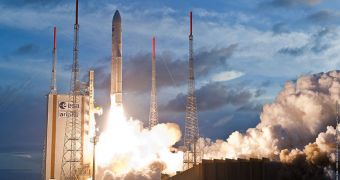Officials at the European Space Agency (ESA) are proud to report that the third Meteosat Second Generation (MSG-3) satellite was launched successfully into a geostationary orbit yesterday, July 5.
The vehicle was carried to space aboard an Ariane V delivery system, which took off from its dedicated facilities at the Kourou Spaceport, in French Guiana, South America. The rocket was provided by French aerospace company Arianespace.
Launch occurred on time, at 21:36 GMT (23:36 CEST), and went on without a hitch. MSG-3 is now on its way towards ensuring the continuation of ESA's efforts to monitor different planetary parameters.
Among MSG-3's primary parameters is providing up-to-date, real-time weather coverage for parts of Europe and Africa. The datasets the spacecraft will produce will be integrated with information coming from other ESA meteorological satellites, spread out in different orbits.
The newly launched vehicle was inserted into the targeted elliptical transfer orbit around 34 minutes after takeoff, and immediately entered under the control of experts at the ESA European Space Operations Center (ESOC), in Darmstadt, Germany.
After ensuring that initial operations are a success, ESOC will hand over control of the satellite to the rightful owner of the vehicle, the European Organization for the Exploitation of Meteorological Satellites (EUMETSAT), which is when the scientific payloads on MSG-3 will be activated.
Now that commissioning has occurred, MSG-3 is known as Meteosat-10. Its position has been fixed above the Gulf of Guinea, over the Equator, at 0° longitude. It travels at the same speed the planet spins, so it will always maintain the same position relative to the surface.
“Tonight’s launch allows EUMETSAT and ESA to continue providing Europeans with high quality observations of weather from space, with MSG-3 being especially valuable in rapid detection and warning of extreme weather situations,” ESA Director General Jean-Jacques Dordain said yesterday.
“For more than three decades now, the exemplary cooperation between ESA and EUMETSAT has been the basis of the success of the Meteosat and EPS/Metop programs,” the top ESA official added.
“These programs have ensured high-quality weather forecasts, the successive generations have improved these forecasts and they have brought tangible economic benefits for and improving the daily life of every European. Two generations have now been developed by ESA and EUMETSAT,” he concluded.

 14 DAY TRIAL //
14 DAY TRIAL //